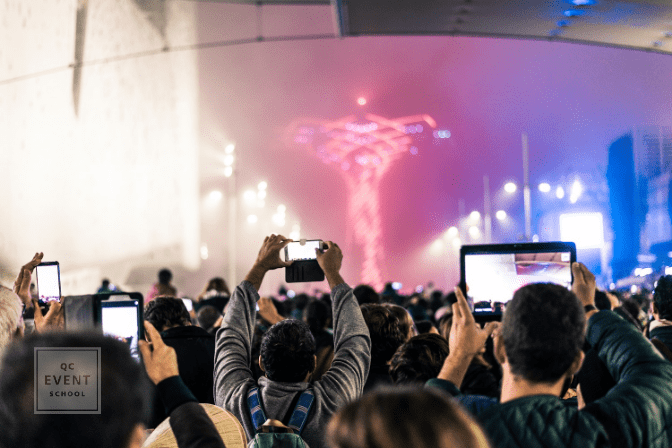
From the Experts, Your Event Career
4 Corporate Event Planning Trends to Watch Out For in 2020
Alyssa Perna has over a decade of event operations experience for leading multinational business-to-business conferences, festivals and trade shows, press conferences, large-scale fundraisers, complex social events, and more. She is the founder of Experience Events, and the Managing Director of Ingenuity Cleveland. She’s also the lead instructor (and tutor!) of the Corporate Event Planning Course at QC Event School.
Unless you attend a variety of different events, attend major event planner expositions, or keep up with reading a ton of industry articles, keeping up with what’s trending in event management can be challenging. Here, we’ll uncover a variety of corporate event planning trends that you can expect in 2020.
From networking and personalization, sustainability, and new event tech and décor – we’ve got you covered, so keep reading!
Networking and Personalization
With limited face-to-face time in the ever-increasing virtual world that we live in, networking has become an even greater focus for corporate events. Venues have shifted focus to provide unique, personalized experiences for attendees.
For example, many venues within the Cleveland, Ohio region (my hometown) now offer a “Cleveland Experience” type of package. These specifically designed experiences may offer food and brews unique to the Cleveland experience, hosted in a venue space that offers a backdrop of the Cleveland skyline.
Beyond venues creating a more personalized experience, organizers are also getting personal during post-event surveys. Organizers are asking more specific questions, such as:
- What types of food do the attendees want to eat?
- What speakers and/or content do they want to hear about?
- And so much more!
After all, the attendee experience will make or break the event! Thankfully, customization is a possibility, thanks to technology. We’ll touch more on this in a bit.
Beyond networking and obtaining valuable feedback (on both the program content and the overall attendee experience), mixing business with pleasure is still a very popular trend. This is most often utilized in the form of destination events.
Attendees want to enjoy the destination just as much as they want to enjoy the event itself. Sometimes, where the event is being held can sway their decision on whether they wish to attend or not. Counter to that, mid-sized cities are also experiencing more event-driven business. This is because they can offer a hometown experience, while tending to be significantly more affordable than some of the major cities like San Francisco, New York City, and Chicago.
Sustainability
Staying sustainable has slowly risen to the top of the priority list for planners — and rightfully so! Being environmentally-conscious is becoming increasingly more important for attendees. For organizations that are working hard to reduce their carbon footprint, it’s also just as critical. Luckily, there are plenty of ways to make your event more sustainable, without being crazy expensive!
Reduce printed materials.
One thing to consider is decreasing the amount of printed materials your event creates. For example, instead of offering printed program booklets to all attendees, some events are going paperless. This means that they instead refer attendees to an electronic agenda that can be found online or through a mobile app.
Believe it or not, investing in a mobile app – which offers an array of solutions for your event beyond posting the event agenda – can be more cost effective than printing program booklets!
Work with a LEED-certified venue.
LEED certified venues offer newer construction and are more energy efficient. They have less water usage and offer better air quality. When the building was being constructed, they used environmentally-friendly building materials and responsible land use. As a nice bonus, LEED-certified buildings may also allow for better access to public transportation.
Use bulk items whenever possible.
Another way to take part in sustainable event planning is to use bulk items for catered functions. For example, instead of using individual sugar packets and creamer packets for coffee, the venue could instead offer creamer in a large carafe, or sugar in a bowl. Instead of having individual yogurts and granola packets, instead offer a fruit and yogurt bar. This will help eliminate packaging waste.
Also trending with sustainability are plant-based diets and healthy food options. Many events are placing a greater focus on wellness initiatives. They may even offer morning yoga, or a group run around the city.
Reduce (or completely eliminate) single-use plastics.
This is not only another popular trend, it’s also one that’s great for the environment! For instance, utilizing flatware (that can be washed and reused) or using 100% compostable plates, forks, spoons, or straws are all becoming the norm.
Give away eco-friendly swag.
Lastly, when it comes to promo items, giveaways, or swag, opt for more eco-conscious items. Reusable stainless-steel straws, or a trendy cork and cotton blend tote bag, are just a couple examples of standard attendee gifts at sustainable events.
Technology
Tech is always trending, and continues to pave the way for the live-event experience. For starters, planners are using mobile phone app solutions for their conferences and events. They’re also using project management tools for larger, more complex projects. You can also utilize technology to your full advantage in team-driven environments that handle large portfolio events.
One trend that’s up-and-coming is using voice technology. Similar to using Siri on your iPhone, voice technology can provide attendees with an even more personalized experience. In late 2019, industry leader, CVent, prototyped the voice technology experience by using Amazon Echo at its user conference. They did this by programming a customized Q&A offering during the event.
Don’t be surprised if you see facial recognition technology used at events in the near future as well! It will likely be used during the check-in process and during events. Beyond this, event tech companies are looking into better ways to maximize RFID technology, too, in order to benefit the overall event experience.
There is also an increase in video content before, during, and after the event. This assists with the pre and post-event marketing experience. When you combine these potential factors, they’re sure to generate unique and personalized experiences for all attendees!
Lastly, it’s worth it to consider virtual meetings, as opposed to its face-to-face counterpart. Virtual meetings were already trending, but are certain to experience an increase due to the COVID-19 health crisis. Not only do they offer more convenience to the parties involved, they’re undoubtedly safer at the current time.
Contract Terms
On the subject of COVID-19, having solid contract terms in place will become a subject of conversation through 2020 and beyond. It’s incredibly important to have a cancellation/rebook clause within your venue agreement(s) and a mutual force majeure.
This means that you and the venue are legally protected if “unforeseeable circumstances that prevent someone from fulfilling a contract” occurs – such as a pandemic.
As we’ve recently discussed, the novel coronavirus has indeed been having an impact on the event planning industry. There are a number of reasons why an event may need to be rescheduled, or even cancelled altogether. Now more than ever, you need to ensure that your contracts are up-to-date and revised, as needed.
Can you think of any other corporate event planning trends that we should be on the lookout for this year? Let us know in the comments!



